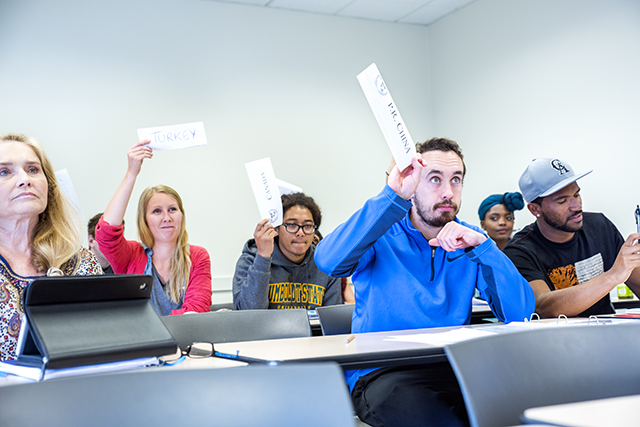
Professor Noah Zerbe’s Model United Nations class meets the world head-on, albeit in a mock fashion. By debating, negotiating, and lightly treading the delicate path of diplomacy, students learn just how difficult it is to get along.
“While students are developing knowledge of the topics they debate and the countries they represent, they are also building practical skills,” said Zerbe, chair of HSU’s Department of Politics. “And they are learning how complicated solving big problems can actually be.”

As part of the experiential component, students are assigned nations to represent, and during each session, must adhere to strict UN protocol. And just like the real world, they try to use the protocol to their advantage, occasionally teaming up with another nation’s representative to effectively utilize their allotted floor time.
As they hone their skills and tactics, students are also learning about the countries they represent and working to understand the topics. For instance, when diplomats from the United States and Great Britain brought a women’s rights bill to the forum, the representative from the People's Republic of Korea was defiant.
The ensuing debate brought to the table cultural norms, and women’s traditional roles. Diplomats feigned the widely varying attitudes, reflecting what they’ve learned about their assigned nation, and others.
“To represent a country, you need to learn the politics, the government structure, the culture, etc.,” said Laura Bogner, a student representing Turkey in this spring’s class. “The class is realistic–you need to give speeches, write proposals, know the protocol. We go through the phases of debate–plenary, substantive–then voting. It’s all very realistic.”
“I’ve learned a lot of China’s stand point on human rights,” said student Tracy Gatumu (Environmental Studies, ’15). I also learned about the Pakistan’s views of the LBGT community and refugees.
Offered every spring, the class generally enrolls 32 students each semester. Most are Political Science or International Studies students who can satisfy components of their majors. Zerbe says there are usually several non-majors in the class as well, and he has seen a wide range of disciplines involved.
“These students might have done Model UN in high school, or might be taking the class as a free elective,” Zerbe say. “They bring a very valuable perspective to the material.”
Highlighting the semester is participation in a conference in San Francisco that brought in assemblies of students from colleges and universities from across the Western United States, Canada, and the Pacific Rim. From April 17-21, HSU’s group acted as representatives of China, Lesotho, Latvia, Panama, and Senegal, interacting with the other schools in debating issues like the abduction and forced sale of persons, and the protection of civilians in armed conflict.
While the conference was a success, the biggest news coming out of it for HSU’s students was an announcement that next year’s event will be hosted by Humboldt State. The 66th session in the program’s history is expected to draw similar participation as this year’s, which included representatives of 27 schools from several states.
Ian Harris (International Business, ‘16), who served as one of the chairs of the General Assembly at the recent conference, has already been heavily involved in organizing the 2016 session.
“The most eye-opening experience this year was learning how much goes on behind the scenes at the conference,” he said. “I’m got to see a completely new side that most delegates don’t see.”
This year’s theme was “The Reach of the UN in the Modern Era: The Conflict Between Individual, Collective and Sovereign Rights.”
“Fully understanding state sovereignty and how this term is used to empower countries is important,” Gamutu said. “It’s also used as a leeway for some countries to have little or no involvement in needed international policies.”